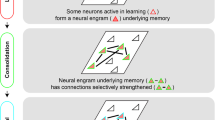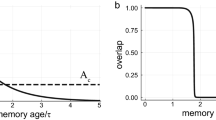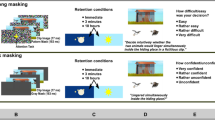Abstract
THE possible recovery of a memory which has disappeared as the result of an electroconvulsive shock (ECS) or some other amnesic agent is of considerable theoretical importance to the understanding of the process by which memories are laid down. Consolidation theory1 assumes that the engram remains susceptible to disruption for a period after its formation and that interference with its consolidation results in its permanent disruption. Evidence suggesting that memories can be recovered2 is rebutted by those who hold to consolidation3. If memories are not permanently destroyed by the administration of amnesic agents, a revision of consolidation theory will be necessary.
This is a preview of subscription content, access via your institution
Access options
Subscribe to this journal
Receive 51 print issues and online access
$199.00 per year
only $3.90 per issue
Buy this article
- Purchase on Springer Link
- Instant access to full article PDF
Prices may be subject to local taxes which are calculated during checkout
Similar content being viewed by others
References
Glickman, S. E., Psychol. Bull., 58 (1961); McGaugh, J. L., Science, 153, 1351 (1966).
Zinkin, S., and Miller, A. J., Science, 155, 102 (1967).
Luttges, M. W., and McGaugh, J. L., Science, 156, 408 (1967).
Lewis, D. J., Miller, R. R., and Misanin, J. R., J. Comp. Physiol. Psychol. (in the press).
Author information
Authors and Affiliations
Rights and permissions
About this article
Cite this article
LEWIS, D., MISANIN, J. & MILLER, R. Recovery of Memory following Amnesia. Nature 220, 704–705 (1968). https://doi.org/10.1038/220704a0
Received:
Revised:
Issue Date:
DOI: https://doi.org/10.1038/220704a0
This article is cited by
-
Basal forebrain cholinergic signaling in the basolateral amygdala promotes strength and durability of fear memories
Neuropsychopharmacology (2023)
-
Update on Memory Systems and Processes
Neuropsychopharmacology (2011)
-
Psychosocial stress after reactivation of drug-related memory impairs later recall in abstinent heroin addicts
Psychopharmacology (2009)
-
Memory involves far more than 'consolidation'
Nature Reviews Neuroscience (2000)
-
Comparative study of retrograde amnesia in rats on active and passive avoidance tasks and spontaneous recovery of memory
Psychopharmacology (1977)
Comments
By submitting a comment you agree to abide by our Terms and Community Guidelines. If you find something abusive or that does not comply with our terms or guidelines please flag it as inappropriate.



